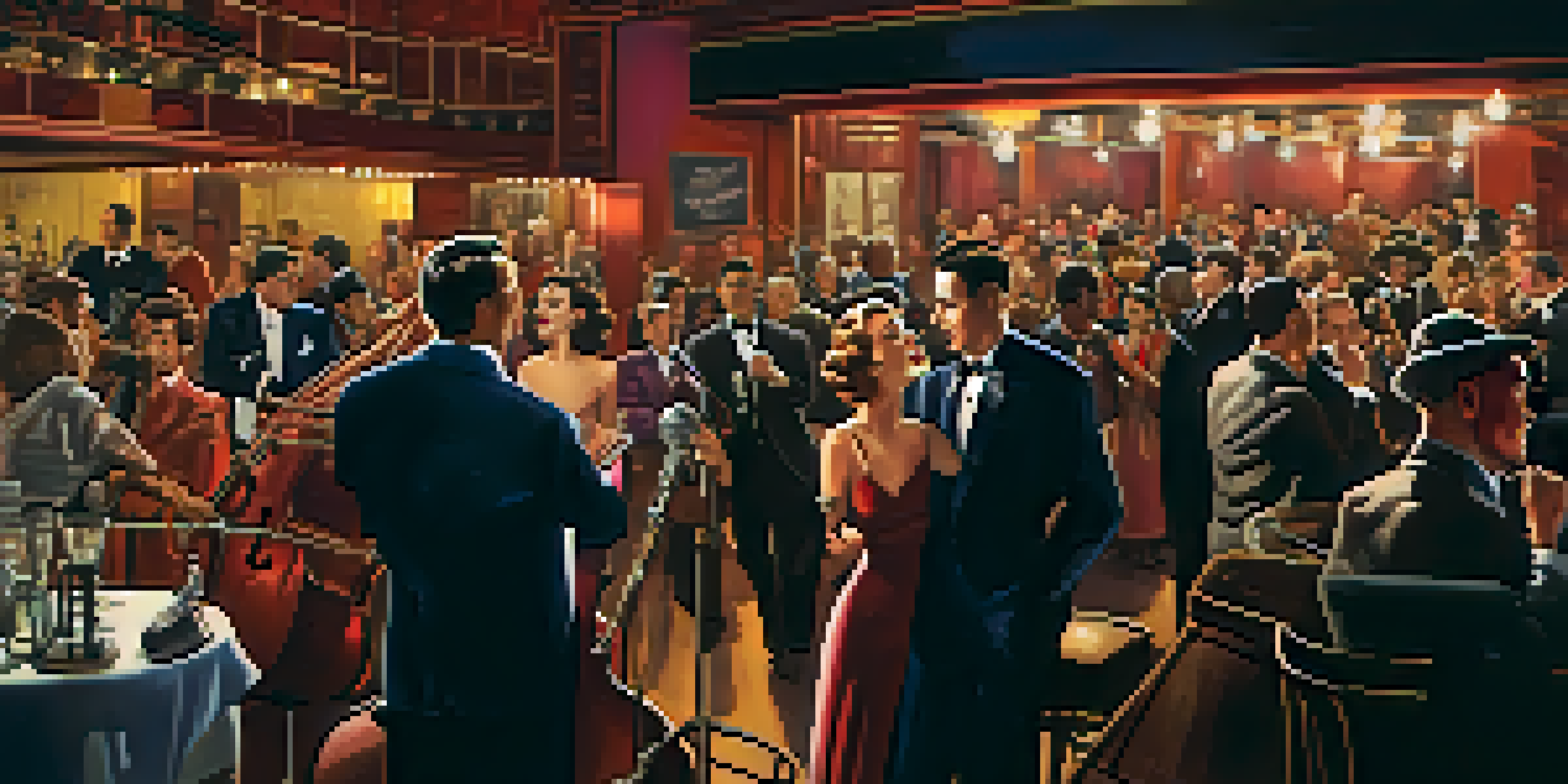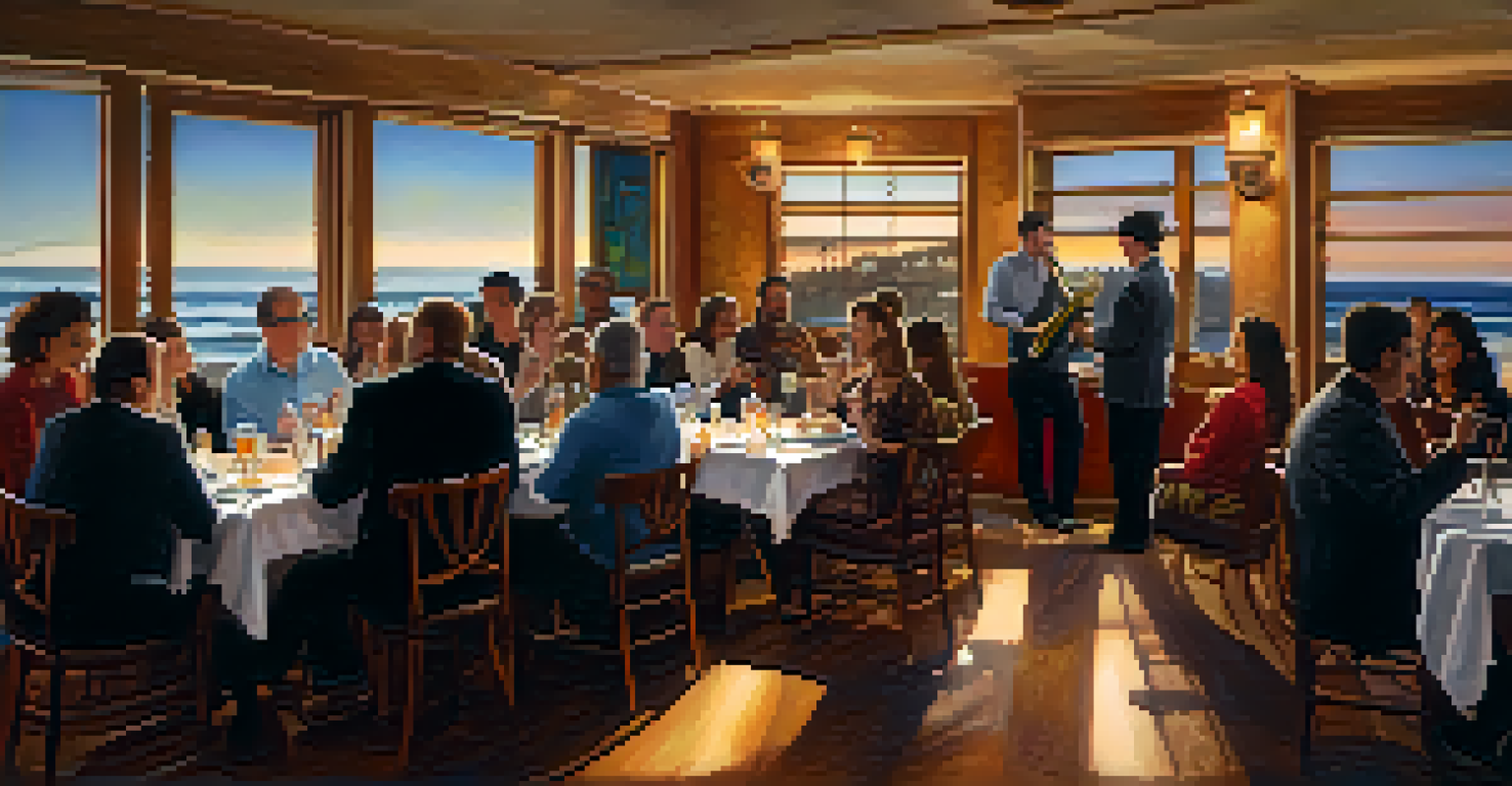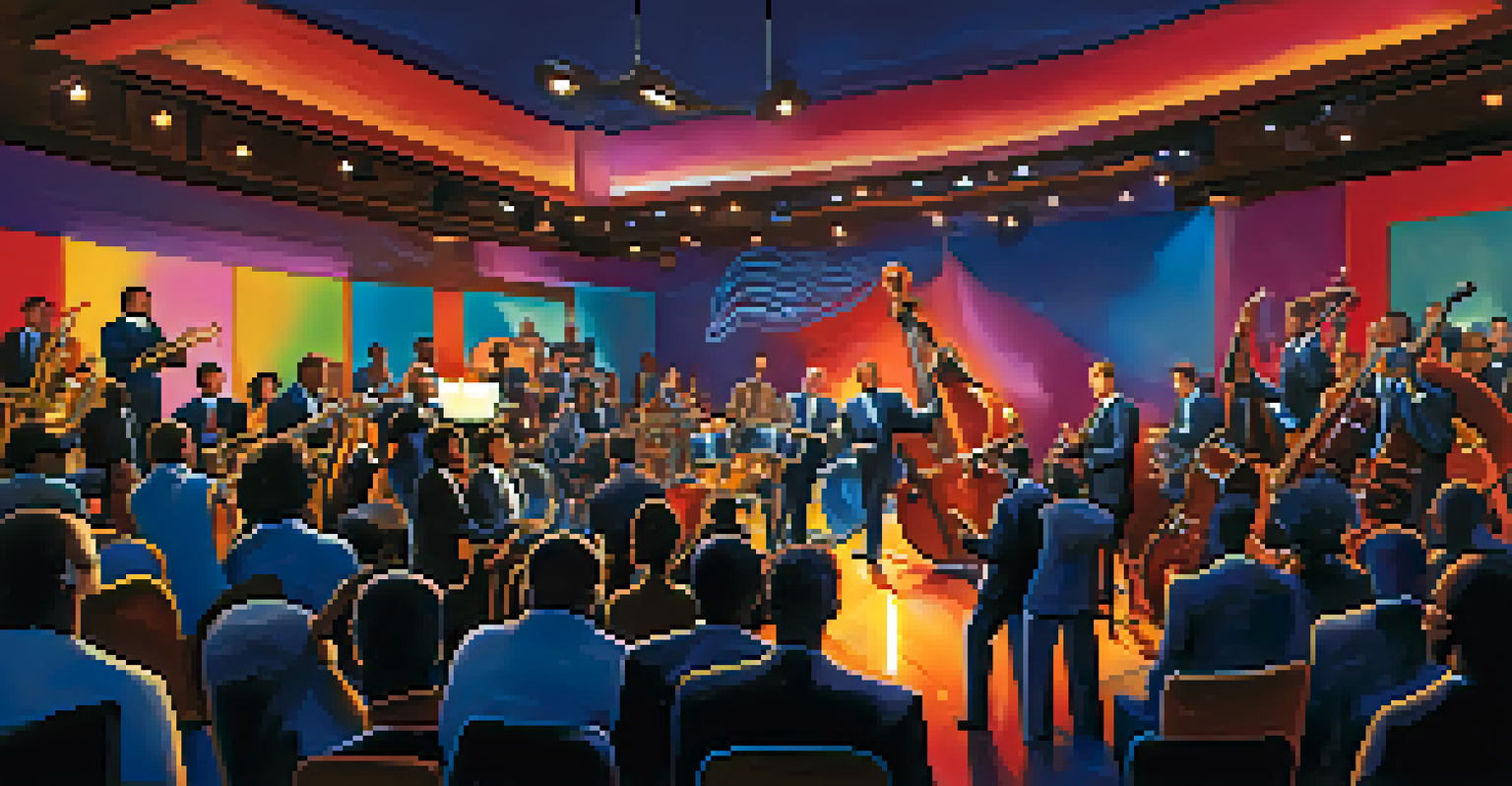LA's Iconic Jazz Clubs: A Journey Through Musical History

The Birth of Jazz Clubs in Los Angeles
Los Angeles has long been a melting pot of cultures, and jazz is no exception. In the early 20th century, as jazz began to evolve, clubs started popping up across the city, creating spaces for musicians and fans alike. These venues not only showcased the genre but also served as a refuge for artists seeking to express themselves freely.
Jazz is the only music in which the same note can be played night after night but differently each time.
One of the earliest hotspots was Central Avenue, where the sounds of jazz filled the air, attracting talent from all over the country. Iconic figures like Billie Holiday and Louis Armstrong graced these stages, helping to establish LA as a jazz capital. The vibrant atmosphere of these clubs fostered a unique sense of community among musicians and patrons.
As jazz continued to gain popularity, these clubs played a crucial role in shaping the musical landscape of Los Angeles. They became the backdrop for countless legendary performances, leaving an indelible mark on the city's culture and history.
The Legendary Cotton Club
The Cotton Club, originally located in Harlem, eventually made its way to Los Angeles, bringing with it a rich history of jazz and entertainment. Though it faced challenges, the LA version of the Cotton Club became famous for its glamorous atmosphere and top-tier talent. This venue was a hotspot for the elite, offering a taste of the high life along with unforgettable musical performances.

At the Cotton Club, guests would enjoy dinner and dancing while being serenaded by some of the greatest jazz musicians of the time. The club often featured acts from the likes of Duke Ellington and Ella Fitzgerald, making it a must-visit destination for any jazz lover. The blend of fine dining and live music created an enchanting experience that still resonates in the city today.
Jazz Clubs Shape LA's Culture
Jazz clubs in Los Angeles have historically fostered community, creativity, and cultural exchange among diverse artists and audiences.
Despite its eventual closure, the Cotton Club's legacy lives on in the hearts of jazz enthusiasts. Its influence can be seen in the many clubs that followed, as they aimed to capture that same magic and spirit of celebration.
The Historic Lighthouse Café
Nestled in Hermosa Beach, the Lighthouse Café has been a cornerstone of the jazz scene since 1949. Known for its intimate setting and stunning ocean views, this club has hosted a plethora of famous musicians over the decades. From jazz legends to contemporary artists, the Lighthouse has remained a beloved venue for both performers and audiences.
The great thing about jazz is that there’s a lot of different things you can do with it.
The café’s unique design features a stage that’s just a few feet from the audience, creating a personal connection between musicians and fans. This close-knit atmosphere allows for spontaneous jam sessions and unforgettable moments that are hard to replicate elsewhere. Many patrons leave with a sense of having experienced something truly special.
As the years have rolled on, the Lighthouse Café has adapted while still honoring its jazz roots. It continues to showcase a mix of legendary names and emerging talent, ensuring that the spirit of jazz remains vibrant and alive in Los Angeles.
The Vibrant Scene at The Blue Whale
Located in Little Tokyo, The Blue Whale is a modern jazz club that has quickly become a favorite among locals and visitors alike. Its sleek design and focus on contemporary jazz create an inviting atmosphere for a new generation of music lovers. The club features an impressive lineup of both established and up-and-coming artists, showcasing the evolution of jazz in real-time.
The Blue Whale's commitment to innovation is evident in its diverse programming, ranging from traditional jazz to experimental sounds. This variety not only attracts a wide audience but also encourages musicians to push their boundaries and explore new directions in their craft. Here, jazz is not just a genre; it's a living, breathing art form.
Legacy of Iconic Venues
Historic venues like the Cotton Club and Lighthouse Café have left lasting impressions on the jazz scene, showcasing legendary performances and nurturing talent.
With its intimate setting and passionate performances, The Blue Whale has established itself as a vital part of the LA jazz community. It embodies the spirit of creativity and collaboration that defines the city’s music scene, continually inspiring both artists and audiences.
The Allure of the Baked Potato
A unique gem in Studio City, The Baked Potato offers a delightful twist on the traditional jazz club experience. Known for its cozy, potato-themed décor and delicious food, this venue combines hearty meals with incredible live music. With jazz being the main dish, patrons can enjoy a meal while soaking in the sounds of talented artists from around the world.
The Baked Potato has hosted an impressive roster of musicians, including renowned jazz guitarists and experimental artists. This eclectic mix of talent creates a vibrant and dynamic atmosphere for attendees, ensuring that each night is a new adventure. The club's intimate setting allows for a personal touch, making every performance feel special.
Moreover, the Baked Potato embraces a sense of community, where regulars and newcomers alike gather to celebrate their love for jazz. This welcoming environment fosters connections between musicians and fans, creating lasting memories and a shared appreciation for the genre.
The Influence of Jazz on LA's Culture
Jazz has not only shaped the musical landscape of Los Angeles but has also influenced its art, fashion, and overall culture. The genre's improvisational nature resonates with the city's creative spirit, encouraging artists across various disciplines to think outside the box. From visual art to film, the rhythms of jazz can be felt in the pulse of LA’s vibrant cultural scene.
Moreover, jazz clubs have served as important meeting places, fostering connections among artists and patrons from diverse backgrounds. These venues often become incubators for new ideas and collaborations, further enriching the artistic fabric of the city. The legacy of jazz continues to inspire generations of performers and creators.
Future of Jazz Remains Bright
The evolution of jazz in Los Angeles continues with new talent and innovative collaborations, ensuring the genre's relevance and vitality for future generations.
As LA evolves, jazz remains a vital part of its identity. The interplay between the genre and the city's culture ensures that the sounds of jazz will continue to echo through its streets for years to come.
Preserving Jazz Heritage in LA
As the jazz scene evolves, preserving its rich heritage has become increasingly important. Organizations dedicated to promoting and protecting jazz music work tirelessly to ensure that future generations can appreciate this vibrant art form. Through educational programs, festivals, and community events, the legacy of jazz is kept alive and thriving.
Efforts to document and celebrate the history of jazz in LA include archives, exhibitions, and performances that highlight the contributions of local artists. These initiatives not only honor the past but also inspire new musicians to carry the torch forward. By sharing stories and experiences, the community fosters a deeper understanding of jazz's significance.

Ultimately, the preservation of jazz heritage in Los Angeles is a collective effort. Musicians, fans, and organizations come together to celebrate the genre's impact, ensuring that the sounds of jazz will continue to resonate throughout the city.
The Future of Jazz in Los Angeles
As we look to the future, the jazz scene in Los Angeles shows no signs of slowing down. With an influx of new talent and innovative approaches to the genre, jazz is evolving while still honoring its roots. This blend of tradition and innovation keeps the spirit of jazz fresh and exciting, appealing to a diverse audience.
Jazz festivals, live performances, and workshops create opportunities for musicians to collaborate and experiment, pushing the boundaries of what jazz can be. As younger generations discover the genre, they bring their unique influences, ensuring that jazz remains relevant in an ever-changing musical landscape.
The future of jazz in Los Angeles is bright, with countless possibilities on the horizon. As long as there are passionate musicians and dedicated fans, the heartbeat of jazz will continue to thrive in this city, creating a legacy that endures.